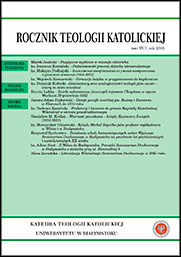Podmiotowość prawna dziecka nienarodzonego
Legal subjectivity of an unborn child
Author(s): Ireneusz KorzińskiSubject(s): Theology and Religion, Canon Law / Church Law
Published by: Wydawnictwo Uniwersytetu w Białymstoku
Keywords: legal status status; of being a person; in vitro fertilization
Summary/Abstract: Contemporary medicine, ethics and law have been trying to pinpoint the exact moment when a being starts to be a human being and as such acquires his specific rights and duties. It is a moot point and there are numerous controversies concerning this issue, because according to some thinkers a human being possesses the status of being a person from the moment of fertilization, according to others this status is acquired only when the embryo is implanted inside the woman’s womb. The law, both civil and canon, plays an important role in this debate. It can be said that it is the positive law that bestows on an embryo a legal status by determining the attribute which is indispensable for being a human (conditio sine qua non). Meeting this condition is required for a human being to possess legal rights and duties, e.g. the right to be protected by the law from the very moment of conception. Unfortunately, the Polish civil law (and in that it differs from the canon law), although it deals wit h the protection of a new life in the mother’s womb and forbids abortion, does not ascribe a legal status to the embryo in an explicit way and thus permits many malpractices concerning an unborn child (for example abortion in specific circumstances and in vitro fertilization).
Journal: Rocznik Teologii Katolickiej
- Issue Year: 15/2016
- Issue No: 1
- Page Range: 15-25
- Page Count: 11
- Language: Polish

